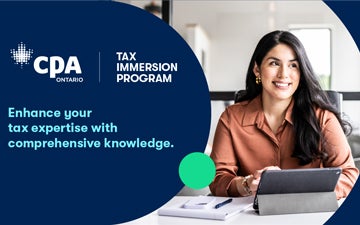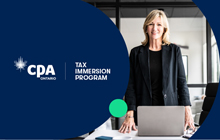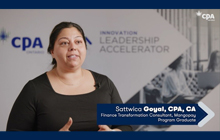Navigating 2025 tax changes: Expert insights from CPA Ontario's expanded Tax Immersion Program

CPA Ontario's Tax Immersion Program equips chartered professional accountants with the skills needed to thrive in the evolving Canadian and US tax landscape
THE 2025 tax year brings with it opportunities and strategic considerations for tax planning, and as a Chartered Professional Accountant, understanding how to leverage these opportunities for your clients and organization is crucial.
To help navigate these developments, CPA Ontario's Tax Immersion Program continues under the expert guidance of Alex Garber, CPA, CA, MTax, and Haroon Khan, CPA, CA. Alex is an award-winning professor at the Schulich School of Business at York University and an independent tax advisor. Haroon is a seasoned tax professional with over 15 years of experience advising private corporations on tax planning, mergers & acquisitions, and cross-border structuring.
Their combined expertise provides a well-rounded perspective on the latest tax developments. To give you insight into what you'll learn as part of the program, we asked them to share their thoughts on key 2025 tax planning opportunities.
Q: What are some of the incentives that could help with tax planning in 2025?
 |
Haroon Khan, CPA, CA, is a seasoned tax professional with over 15 years of experience advising private corporations on tax planning, mergers & acquisitions, and cross-border structuring. |
Haroon Khan: There are several planning opportunities, especially for private business owners:
Ontario Made Manufacturing Investment Tax Credit offers a strong planning opportunity for clients in the manufacturing sector. Starting May 15, 2025, the credit will increase from 10 percent to 15 percent on eligible investments in buildings, machinery, and equipment used for manufacturing or processing in Ontario. The program will also expand to include non-CCPCs through a new non-refundable credit, opening the door to a wider range of businesses. With a maximum annual credit of up to $3 million per associated group, both CCPCs and non-CCPCs should start planning or accelerating capital investments now to take full advantage before the program ends on January 1, 2030.
The Lifetime Capital Gains Exemption (LCGE) was increased to $1.25 million starting in 2025. This is a key tool in succession planning and can be multiplied across family members if shares are structured properly. We are encouraging clients to review their share ownership now to ensure they can benefit fully when the time comes to sell.
The Canadian Entrepreneurs' Incentive (CEI) is separate from LCGE and applies to qualifying shares issued on or after January 1, 2025, that are held for at least five years and meet specific conditions. The incentive provides a reduced capital gains inclusion rate of 1/3 on up to $2 million in lifetime capital gains per individual. The $2 million CEI limit will be phased in over 5 years, starting at $400,000 in 2025 and increasing by $400,000 annually to reach $2 million by 2029.
While the CEI was initially positioned as a founder shareholder incentive, you do not need to be the original founder to qualify. However, you must have acquired newly issued shares directly from the corporation, typically in exchange for money, property, or services, and meet all other requirements. This incentive is not available to professional corporations among some other exceptions.
Employee Ownership Trusts (EOTs) have created a unique tax planning window. For qualifying sales to an EOT between 2024 and 2026, up to $10 million of capital gains can be exempt from tax. That said, it's best suited for owners with stable businesses and employee teams who want to take over.
Intergenerational Transfers provide a valuable way for clients planning to transition their business to the next generation, though these rules are still relatively new.
Overall, we are seeing a growing need for exit and succession planning. These incentives can create real tax savings, but only if business owners start planning early and structure things right.
 |
Alex Garber, CPA, CA, MTax, is an award-winning professor at the Schulich School of Business at York University and an independent tax advisor. |
Alex Garber: Although the proposed increases to the taxation of capital gains that were initially announced have since been scrapped, various changes — particularly relating to the sale of a business — are still in effect. As Haroon mentioned, these include the capital gains exemption increasing to $1.25M per person, the new Canadian Entrepreneurs' Incentive to decrease tax on capital gains for business founders that sell their business, and the sale of a qualifying business to its employees via the use of a special "Employee Ownership Trust" which can result in no tax at all on up to $10M of a gain (for 2024, 2025 and 2026 only).
As a large proportion of business owners in Canada approaches the age of retirement, these various incentives could translate into significant tax savings when selling an existing business. That being said, the "devil is in the details" as usual to make sure that one qualifies for these benefits.
Q: Enhanced trust reporting rules continue to be in effect. What are the key compliance challenges CPAs are seeing with these requirements, and what strategies can help ensure clients meet their obligations?
Haroon Khan: The new trust rules are mostly about logistics. The government has temporarily paused the reporting requirements for bare trust arrangements, which has been welcomed as significant relief. However, this pause is only temporary, and we are still awaiting further updates and guidance on the matter.
Once the bare trust rules come into effect, one of the biggest challenges will be clients who are unaware they have a trust that requires filing. A common example is a parent holding property jointly with a child, which can trigger a filing requirement under the expanded definition of a bare trust.
I think practitioners should proactively reach out to their clients during the summer and fall to identify potential bare trust arrangements early rather than during the busy tax season.
Alex Garber: In my view, the biggest challenge for CPAs when it comes to the expanded trust reporting requirements is simply the time and effort it takes to gather the required information from the client. Specifically, many trusts must now disclose specific information about who the beneficiaries are, including their address, SIN number, etc. In the past, this was not required.
My biggest suggestion for CPAs is this: start early ... Don't leave the "information gathering" process until February or March, when trust returns are due to be filed. Rather, proactively look at which trusts need to file ahead of time and reach out to those clients in the summer or fall, to leave yourself plenty of time.
Q: What other tax areas should CPAs prioritize in their practice? Are there emerging compliance requirements or upcoming changes that warrant attention?
Haroon Khan: Several areas deserve attention:
Mandatory Disclosure Rules (MDR) are live now and apply to certain types of tax planning and reporting. If you are doing transactions that involve avoidance of reporting or confidentiality clauses, it's worth checking if they trigger disclosure.
In my practice, I work extensively with cross-border tax matters. Due to recent policy decisions, I have observed an increase in clients selling their U.S. properties. It is essential to engage in proactive discussions with clients to ensure that both Canadian and U.S. tax compliance obligations related to these sales are addressed efficiently and in a timely manner.
Do not overlook the Underused Housing Tax (UHT) rules and the various reporting requirements for short-term rentals across different municipalities. If you own a short-term rental property, there are multiple compliance obligations at the federal, provincial, and municipal levels that need to be carefully managed.
Alex Garber: The annual Federal Budget is typically released in March or April. This year, it has been delayed until the Fall, due to ongoing economic and political considerations. There is quite a bit of anticipation with the 2025 Federal Budget, to see what tax developments the government may introduce (or remove) in response to our current economic and political climate. We'll have to wait and see what happens.
CPA Ontario Tax Immersion Program
To help navigate these complex changes, CPA Ontario has expanded the Tax Immersion Program to offer comprehensive tax education through multiple learning streams.
Led by instructors with decades of experience, this program now offers three distinct pathways to equip CPAs with the knowledge and tools to thrive in the 2025 tax environment:
- Tax Immersion Program (Personal & Corporate Tax) — Essential tax principles in income tax, capital transactions, and shareholder taxation
- Part 2 (Income Tax & Specific Topics) — Advanced income tax concepts and specialized areas such as commodity tax, real estate and estates and trusts
- Owner-Managed Structures (Tax & Accounting for Small Businesses) — Focused on the unique needs of small business taxation and accounting
What You'll Learn
These programs go beyond federal updates and you'll gain valuable insights into relevant nuances for Ontario tax. This holistic approach ensures you're prepared to handle your clients' or organization's tax needs across all business structures and complexity levels.
Through these comprehensive learning streams, you'll enhance your tax knowledge and apply your learning effectively. You'll be well-equipped to address and strategically leverage these tax updates as well as provide exceptional tax advice whether you're working with individuals, corporations, or owner-managed businesses.
Get ready for the 2025 tax season: Register today.
Haroon Khan CPA, CA, is a seasoned tax professional with over 15 years of experience advising private corporations on tax planning, mergers & acquisitions, and cross-border structuring.





(0) Comments